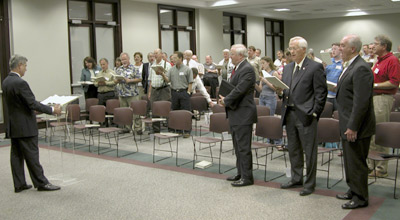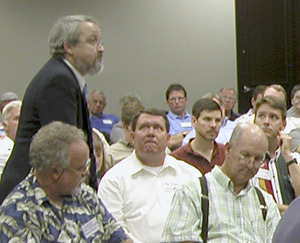At a forum where the dialogue was by turns both plainspoken and conciliatory, about 70 music and worship ministers and church musicians gathered July 13 at the South Carolina Baptist Convention building to talk with leaders about the future of the SCBC’s music and worship department.
 At the request of SCBC executive director-treasuer Carlisle Driggers, left, a group of music ministers and musicians sings “Blessed Be the Name” to conclude a special meeting held in Columbia July 13 to discuss the future of the convention’s music and worship office.
At the request of SCBC executive director-treasuer Carlisle Driggers, left, a group of music ministers and musicians sings “Blessed Be the Name” to conclude a special meeting held in Columbia July 13 to discuss the future of the convention’s music and worship office.The meeting, a “helpful conversation,” as called for in a June 20 memo from convention executive director-treasurer Carlisle Driggers, followed the announcement in March of Jim Gill’s retirement as director of the SCBC music and creative worship group. Reports soon began circulating of a planned reorganization of the music and worship area.
Most music ministers who spoke at the July 13 meeting voiced frustration over not being consulted about plans for changes in the department, changes that include eliminating a full-time position and hiring part-time consultants to handle the remaining work load.
Roger Orman, director of the convention’s church development team, said the process of finding a new director for the renamed Worship and Music Office has already begun. He also outlined a plan to replace the position of associate director with up to eight part-time “consultants” drawn from the ranks of church music and worship ministers and musicians across the state.
“We are discovering that there are a diversity of churches out there,” Orman said. “I believe that if we have the right consultants, they can bring value to this organization. We’re finding ways to get into servicing churches that didn’t think of us before.”
Driggers pointed to the unique challenges in music ministry leadership of coordinating many different events while serving a wide range of age groups. “We began to feel that, by using very capable people across the state as specialists and consultants, we could make good use of our moneys and time,” he said. “It is a way to broaden and strengthen what we do. No two churches are doing the same thing in music anywhere. To try to respond to that is a chore. To use the dollars we’ve got to respond as best we can is a real challenge for us.”
Morris Driggers (no relation to Carlisle Driggers), minister of music at First Baptist Church, Clinton, cautioned that the convention should be responsive to a “strong need of resources” by churches in the 21st century, a need “that cannot be provided if we are not adequately staffed.”
 Charles Roberts, minister of music at First Baptist Church, Hartsville, rises to speak during the July 13 meeting.
Charles Roberts, minister of music at First Baptist Church, Hartsville, rises to speak during the July 13 meeting.Charles Roberts, minister of music at First Baptist Church, Hartsville, questioned the efficacy of hiring part-time consultants. He cited an example of reported customer dissatisfaction when an industry headquartered in his town tried using part-time professionals.
Mark Blankenship, minister of music at First Baptist Church, Hilton Head Island, called for increased priority and funding for worship and music. “I would love for South Carolina to be the one to lead out and say, look what can happen to the churches when we really emphasize the importance of worship.”
Another concern for music ministers was the announced intention, beginning next year, to integrate the Youth MusicArts Camp, traditionally a stand-alone week for students with a strong interest in music, into Summersalt, the SCBC’s summer youth camp held over four weeks each June at White Oak Conference Center.
Orman said the music camp, which attracted 100 6th-12th graders this year and was held at Anderson University, would become part of a specially designed music emphasis week at Summersalt in 2007. He cited the need to be “cost effective” and to “make sure stewardship is well served.”
George Haltiwanger, minister of music at First Baptist Church, Moncks Corner, pointed to the “uniqueness” of the music camp and said it helps inspire “our future leaders” in church music. “I don’t believe that, all the time, you can measure value of ministry in wise use of money,” Haltiwanger said.
Lee Myers, minister of music at Cedar Creek Baptist Church, Blythewood, said he was a “direct product” of the youth music camp. “The smallness is what makes it successful,” he said.
Mike Hamlet, pastor of First Baptist Church, North Spartanburg, and chairman of the Executive Board of the SCBC, challenged the music ministers to look beyond their area of ministry and “see the big picture of what God has for our convention.”
Near the end of the meeting, Carlisle Driggers said it was “obvious we’ve got to do a better job communicating.” “It’s also obvious that we’ve been doing some communicating, and we haven’t been heard, so we’ll work on that together.”
The nearly three-hour meeting was twice punctuated with spontaneous hymn singing. As the meeting concluded, Driggers asked those remaining to sing “Blessed Be the Name.”
“I loved the spirit of worship and togetherness that we moved toward throughout the meeting,” said Mark Powers, associate pastor for music and worship at First Baptist Church, North Augusta. “I feel that we are united to see God work in a powerful way across the coming years through our state convention music office.”
Roger Dail, minister of music and worship at Second Baptist Church, Lancaster, offered a more reserved assessment: “I believe the convention is trying to accommodate the needs of a changing culture musically, while hopefully not alienating those who have laid the groundwork with their blood, sweat and tears over the last 30 years or so. At the same time, they are attempting to make it work within a streamlined budget. This is a most difficult task.”